Burnout and Compassion Fatigue: How to Stop Them from Draining Your Battery
Burnout
When your phone or computer’s battery is low, you get an alert. For a lot of folks, what you do next is Pavlovian. You grab your charger and plug it in. Now, if you’re without a charger, then you’re taking a walk on the wild side of life. Most devices nowadays go into “low power mode” to conserve battery. Believe it or not, this is a perfect example of burnout. As human beings, we may be more subtle with our alerts, but if you pay close enough attention, you can pick up on the signals that our bodies are sending. And if you have the right tools, you can charge your battery back up to 100%. If not, then you risk going into your own version of low power mode.
Life is not without stress. According to the APA’s 2021 Work and Well-Being Survey, “79% of employees had experienced work-related stress a month before the survey.” If nothing is done to manage the stress or lessen the workload, it can lead to fatigue, loss of motivation, and lack of interest in your job.
Compassion Fatigue

Compassion fatigue is often mislabeled as burnout. Where burnout is a more general reaction to feeling overworked and stressed, compassion fatigue limits your ability to cope with stressful situations, while you are simultaneously attempting to perform your job well. This is most commonly seen with individuals in helping positions (e.g. healthcare workers, teachers, lawyers, first responders, and mental health workers), but can also include individuals who are the primary caregiver for a loved one.
It’s been 3 and a half years since the shelter-in-place orders from the COVID-19 pandemic. Everyone witnessed healthcare workers go above and beyond to provide necessary care to their patients. The stressful work environment combined with experiencing the secondary trauma of caring for patients in not normal circumstances increased risk of compassion fatigue for healthcare workers everywhere.
Compassion fatigue impacts your ability to provide care for others. For helping professions, this can mean negative outcomes. Even if you are not in a helping profession, it can be helpful to learn about your body’s alert system that might indicate signs of burnout. It can also be useful to learn different tips and tricks to manage burnout or compassion fatigue, so that you can provide support to those you know in a helping profession.
The Low Battery Alert
There are four areas that can be impacted by burnout and compassion fatigue. If you notice there are more negative changes to these areas, your battery is getting low and increasing risk for burnout that is long-term. If burnout is unmanaged, your daily functioning can become impacted and, at worse, jeopardize your job and relationships.
- Emotional: All emotions have purpose and they can also overwhelm us, making it impossible to separate from the negative or difficult experiences. What feelings do you notice when you’re going to work? What about while you’re there? And, lastly, when you’re heading home at the end of the day? Dread, helpless, miserable, or irritated are all answers to these questions that could indicate burnout.
- Physical: Almost every college student gets sick after finals. It’s a high-stress situation where most students are not sleeping or eating balanced meals. So, the body reacts. When thinking about your work, are there any physical sensations that you notice? Common physical symptoms of burnout and compassion fatigue are headaches, fatigue, illness, or muscle tension.
- Spiritual: Whether you have a spiritual identity or not, everyone has a belief system that guides their work. Think about your worldview and your values. When you’re experiencing compassion fatigue, your worldview and values are questioned. As a helper, it is important to recognize those thoughts that are the antithesis of your beliefs, like “I hate people” or “Nothing I do matters.”
- Relational: Relationships provide support when you’re feeling stressed. It’s difficult to show up in your relationships when you’re not feeling 100% charged. What’s different about how you show up with a low battery? Irritability and isolating are signs that you may need to recharge. If left unmanaged, it can lead to not feeling connected in your relationships.
Charging the Battery
“If you listen to your body when it whispers, you won’t have to hear it scream.” - Cherokee proverb
- Self-Reflection. How do you show that you’re distressed? If you’re unsure, think of past times that felt difficult or stressful. What do you remember that might fit into one of those four areas? As you become more aware of your stress signals, you can then develop your toolbox to manage the distress. An additional resource is the ProQOL, which is a measuring tool for the helpers of the world to encourage reflection on the positive and negative aspects of their work.
- Connect with Community. The shift to remote work that occurred during the COVID-19 pandemic offered folks a new level of flexibility in their day-to-day lives, but caused increased feelings of isolation and loneliness. Gone are the days of casual check-ins in the break room to talk about when Stranger Things is coming back. If you’re feeling overwhelmed, alone, or burnt out in your current remote position, remember that jobs are stressful and it’s hard to manage that stress by yourself. Consider planning a day to go into the office with your coworker, or schedule a coffee meeting at your favorite cafe to help build community in the workplace.
- Celebrate the Good Things. Compassion satisfaction is the antidote to compassion fatigue for helpers. Think about those days you come home from work and feel amazing because of the work you did. It’s a reminder of your motivations and purpose that connect you with the parts of your work that are rewarding.
- Sleep and Rest. Sleep affects our mental and physical health just as much as nutrition and exercise. When you are stressed, it’s likely that you are not getting sleep that is restful. So, let’s talk about your sleep routine! Think about whether you go to bed at the same time every night. What do you do before bed that sends the message to your brain that you’re winding down for the day? Showering, washing your face, reading a non-stimulating book, drinking non caffeinated tea, or journaling to reflect on your day are all things to consider adding to your sleep routine.
- Exercise. Speaking of exercise, it’s also important! Now, this does not mean that you have to go get a gym membership today or engage in any activities that cause you pain or stress. Instead, studies show that moving your body for 10 minutes a day has benefits for your mental health. A key part of exercise is to find something that you enjoy so that you can make it a regular part of your routine. Remember when you were young and what games you loved playing on the playground or in the park. Remember that feeling and lean into it with whatever exercise you choose!
- It’s Okay to Ask for Help. There’s always some level of truth to the cliches. If you struggle with asking for help, think about where that might be coming from. Is there something you tell yourself that prevents you from doing it? For instance, that you’re not strong or that you’re a burden. Depending on what area of your life is causing the most stress, consider if there is someone that you trust who would help you, if you asked.
Additional Reading
- Burnout: The Secret to Unlocking the Stress Cycle by Dr. Emily Nagoski
All material provided on this website is for informational purposes only. Direct consultation of a qualified provider should be sought for any specific questions or problems. Use of this website in no way constitutes professional service or advice.




